Liver Cancer Treatment by Percutaneous Embolization (coiling) in Germany
Treatment prices are regulated by national law of the corresponding countries, but can also include additional hospital coefficients. In order to receive the individual cost calculation, please send us the request and medical records.
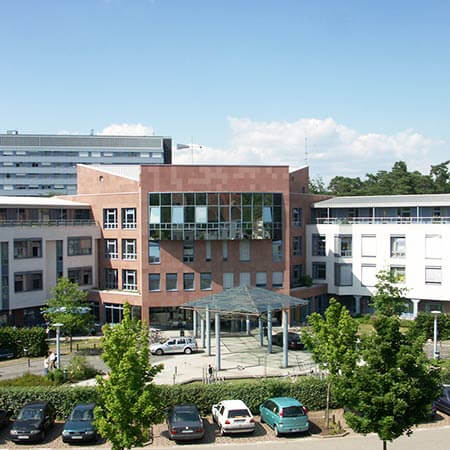
Department of Interventional Neuroradiology
The Department of Interventional Neuroradiology offers the full range of services in the areas of its specialization. The medical facility provides imaging diagnostics and low-traumatic image-guided interventional treatment of nervous system diseases. The department's specialists have rich experience and exceptional professional skills in the field of interventional procedures for acute and chronic vascular diseases, such as ischemic strokes, brain hemorrhages, cerebral artery stenosis, brain aneurysms, and vascular malformations. The department's neuroradiologists cooperate closely with neurologists and neurosurgeons so that each patient receives an optimal treatment regimen based on the expert opinions of the specialists. The department's medical team has state-of-the-art computed tomography (CT), magnetic resonance imaging (MRI), and MR angiography systems that are actively used for diagnosing patients and therapeutic procedures. Medical care is provided in compliance with current clinical protocols. The department also offers many outpatient medical services, which is an advantage for many patients.
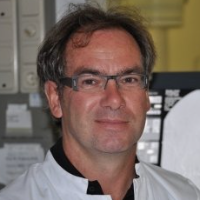



Department of Adult and Pediatric Diagnostic, Interventional Radiology
The Department of Adult and Pediatric Diagnostic, Interventional Radiology offers all modern methods of high-precision imaging diagnostics and minimally invasive imaging-guided therapeutic procedures. The department meets all radiation protection standards, which are especially important in the diagnostics of children and adolescents. The basis of successful clinical practice of the medical facility is a progressive technological base and the best highly qualified specialists.
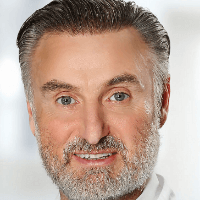

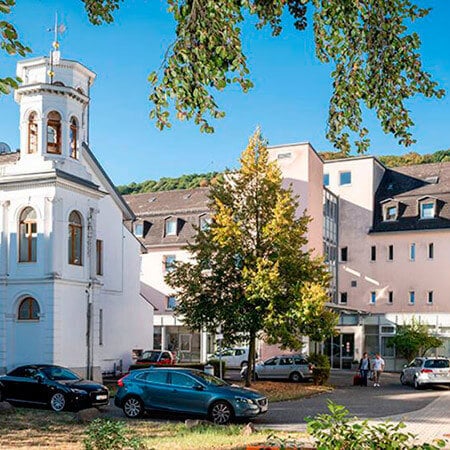
Department of Interventional Radiology
The Department of Interventional Radiology offers the full range of modern diagnostic procedures using ionizing radiation, image-guided tissue sampling (biopsy), and minimally invasive therapeutic procedures. Patients may be seen on an inpatient or outpatient basis. To achieve optimal results, the department works closely with specialists in radiation therapy, oncology, neurology, neurosurgery and neuro-oncology, as well as urology, orthopedics, pain management, and palliative care. This collaboration helps ensure an accurate diagnosis and the most effective treatment.
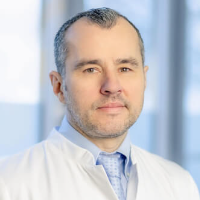



Liver cancer (carcinoma, liver cell cancer) is a malignant disease of liver cells. Since liver cancer accounts for less than 2% of all oncological diseases, it is a rare tumor. The peak incidence occurs at 50-70 years of age. Avoiding alcohol is the most effective preventive measure. Along with primary liver cancer, very often (about 90% of cases) metastases of other tumors are found in the liver.
Content
- Overview
- Types
- Symptoms
- Diagnostics
- Treatment
- Where can I undergo percutaneous embolization (coiling) in Germany?
- The cost of treatment in Germany
- How can I undergo percutaneous embolization (coiling) in Germany?
Overview
The liver is one of the largest organs in the human body, it has a pyramidal shape and is located in the right hypochondrium. The liver is divided into two sections called lobes. It has two sources of blood supply: the hepatic artery carries oxygen-rich blood, and the portal vein supplies the liver with nutrient-rich blood from the intestines.
The liver is a vital organ, without which the body cannot function. It breaks down and stores nutrients from the intestines, produces bile necessary for proper digestion, plays an important role in blood clotting, helps to remove waste substances, etc.
From 60% to 80% of the mass of the human liver are hepatocytes – cells that are involved in the synthesis and accumulation of proteins, cholesterol. They play an important role in the metabolism of carbohydrates, bile formation, as well as in detoxification and deactivation of the hormones that are synthesized in the body.
Depending on the etiology, malignant neoplasms of the liver are divided into primary and metastatic ones. The most common primary malignant tumor of the liver is hepatocellular carcinoma, i.e. a tumor originating from the hepatocytes. Less common are cholangiocarcinomas or cholangiocellular carcinomas, i.e. tumors from the epithelium of the intrahepatic bile ducts. Metastases in the liver from primary tumors of other localizations occur much more often than the primary liver tumors. The spread of metastases is explained by the intensity of liver vascularization. Almost all tumors metastasize to the liver, colorectal tumors – more often than others.
In most cases, this cancer appears against the background of liver damage, e.g. in cirrhosis or hepatitis B and C. In rare cases, liver cancer initially develops in a healthy organ.
The most common form of liver cancer is hepatocellular carcinoma, which arises due to the malignant transformation of hepatocytes.
About 80% of liver cancer cases occur in men and manifest itself with fatigue, loss of appetite, nausea, and pain in the upper right abdomen. Liver cancer can also be detectable during palpation.
The risk factors that facilitate the development of liver cancer include:
- Cirrhosis (destruction of liver cells due to fibrotic lesions caused by prolonged irritation of cells). Cirrhosis often occurs in patients with alcohol abuse or hemochromatosis. Cirrhosis is the main risk factor for liver cancer development. Besides, about 90% of liver diseases are diagnosed in people with cirrhosis.
- Chronic hepatitis B and /or hepatitis C in combination with liver cirrhosis.
- Obesity (non-alcoholic fatty liver disease and nonalcoholic steatohepatitis).
- Diabetes mellitus.
- Smoking.
Types
Histologically, there are:
- Hepatocellular carcinoma. Hepatocellular carcinoma is a tumor that consists of liver cells, therefore, it is similar in structure to the liver.
- Cholangioma. Cholangioma is a malignant tumor of biliary tract cells; therefore, it does not resemble the liver in structure. This type of tumor metastasizes to the lymph nodes and lungs.
- Hepatocholangioma (mixed form).
In general, in 80% of cases liver cancer develops in patients with liver cirrhosis (against the background of hepatitis B and C, and hereditary hemochromatosis). Due to its functions, the liver is an organ that is more often affected by a metastatic process. Liver metastases are found in the tumor initially developed in the cervix uteri, lungs, mammary glands, and colon. The tumor metastases arise at the 4th stage of the oncological process, initially entering the liver through the bloodstream.
Symptoms
At the early stages, nothing indicates the disease. But already at the first stages of the malignant process, carcinoma can be detected on ultrasound images. Signs of liver cancer include general symptoms, that are typical to all malignant tumors, and local ones, that are associated with liver damage:
- Pain on the right side under the rib
- Nausea
- Bloating
- Poor appetite
- Weight loss
- Fatigue
- Increased temperature
- Jaundice
- Nosebleed
- Ascites
- Itchy skin
With a significant increase in the organ size, there is heaviness on the right side under the rib, which becomes more severe with food intake. With a tumor that is localized close to the liver capsule, severe pain occurs. Over time it exasperates, and patients with advanced cancer stages need injections of analgesics or drugs, sometimes several times a day. Back pain is often noted. Signs of liver failure and the development of ascites appear in cases of liver cirrhosis.
Diagnostics
The main problem is that at the early stages liver cancer has no specific symptoms. Patients seek the advice of a specialist only when severe symptoms appear. In patients at high risk (e.g. patients with hepatitis and cirrhosis) it is possible to detect a neoplasm even at the early stages. A twofold increase in tumor size is observed within 2-4 months; therefore, it is advisable to conduct diagnostic screenings twice a year.
For diagnostics, modern methods are used such as ultrasound scanning, MRI, angiography, spiral CT, PET, CT with the contrast agent. Abdominal ultrasound scanning is the simplest and most affordable method. With the help of ultrasound scanning liver cancer is detected at an early stage in 60-80% of patients.
To determine whether metastases are present in the bone tissue, radioisotope scintigraphy is used, and for metastases in the vessels contrast angiography is used.
Monitoring the state of the liver includes assessment of liver cancer progression, presence of nearby and distant metastases (small foci less than 1 cm), as well as assessment of liver function. A comprehensive clinical picture is provided by computed tomography or MRI with liver-specific contrast agents.
Blood tests can also be used to detect liver cancer. Serological diagnostics includes the assessment of tumor markers level in the blood.
Treatment
Embolization is an effective method for liver cancer treatment. It is based on the destruction of cancer cells using coils delivered to the tumor through the vessels. They block the flow of arterial blood to the tumor tissues, depriving it of oxygen and nutrition, which leads to the destruction of malignant cells.
Most often, embolization is used in liver cancer treatment and in patients with liver metastases, since it is the arterial blood that feeds the cancer cells of this localization. It is used in the treatment of primary liver tumors and in the treatment of metastases in the liver, including metastases from breast cancer, colorectal cancer, neuroendocrine tumors that have spread to the liver. Also, embolization is used as palliative care when it is impossible to cure liver cancer completely, but the method helps to slow down tumor growth, and also allows alleviating the symptoms of the disease, thereby improving the patient's quality of life. In addition, embolization is suitable for those patients who cannot undergo surgery or liver transplantation. Embolization is often used in combination with other treatment methods, such as chemotherapy, to kill cancer cells as much as possible.
In modern medicine, local endovascular embolization is considered an innovative minimally invasive treatment method with proven effectiveness. Recently, the effectiveness of embolization in breast cancer, in neuroendocrine tumors, renal cell carcinoma, various sarcomas, melanoma, as well as in liver cancer has been proven.
Embolization is performed as the local intervention under the visual control, in the angiographic unit. Repeated embolization procedures are possible, but usually not required.
Percutaneous embolization requires selective catheterization of the liver vessels followed by their occlusion. Although many devices and agents have been created for this purpose, current techniques use both platinum coils and embolizing microspheres.
The essence of the embolization procedure is to bring a thin catheter under the control of an angiographic device to the artery that feeds the liver tumor and to introduce the coil directly into the target vessel. The use of the catheterization of the vessels allows the targeted introduction of coils without any damaging effect on the healthy organs. In order to avoid injury to vital organs adjacent to the tumor, embolization requires work of a highly qualified endovascular surgeon. The clinical result of this method of treatment includes a decrease in the size of the tumor. In the case of a reduction in the tumor volume to a diameter of 4 cm, further additional embolization of the blood vessels feeding the neoplasm is performed, which leads to ischemia and final tumor necrosis.
Embolization is well tolerated by patients and is associated with minimal risk of complications during and after the procedure. The most significant side effect of this manipulation is the so-called "post-embolization syndrome". This syndrome is temporary, and the patient recovers from it within a few days. Most patients return home the next day after embolization. Other side effects are not observed with embolization.
Today, with the advent of modern diagnostic systems and digital imaging methods, with the development of high-tech equipment, and with the creation of new devices for the procedure, the effectiveness of the technique is becoming more and more obvious.
Where can I undergo percutaneous embolization (coiling) in Germany?
Health tourism is becoming more and more popular these days, as medicine in Germany often ensures a much better quality of percutaneous embolization (coiling).
The following hospitals show the best success rates in percutaneous embolization (coiling):
- University Hospital Saarland Homburg
- University Hospital Halle (Saale)
- University Hospital Muenster
- University Hospital Oldenburg
- Charite University Hospital Berlin
You can find more information about the hospitals on the Booking Health website.
The cost of treatment in Germany
The prices in hospitals listed on the Booking Health website are relatively low. With Booking Health, you can undergo percutaneous embolization (coiling) in Germany at an affordable price.
The cost of treatment varies, as the price depends on the hospital, the specifics of the disease, and the complexity of its treatment.
The cost of treatment in Germany with percutaneous embolization (coiling) is 7,862-12,639 EUR.
You might want to consider the cost of possible additional procedures and follow-up care. Therefore, the ultimate cost of treatment in Germany may differ from the initial price.
To make sure that the overall cost of treatment in Germany is suitable for you, contact us by leaving the request on the Booking Health website.
How can I undergo percutaneous embolization (coiling) in Germany?
It is not easy to self-organize any treatment abroad. It requires certain knowledge and expertise. Thus, it is safer, easier, and less stressful to use the services of a medical tourism agency.
As the largest and most transparent medical tourism agency in the world, Booking Health has up-to-date information about percutaneous embolization (coiling) in the best hospitals in Germany. We will help you select the right clinic taking into account your wishes for treatment.
We want to help you and take on all the troubles. You can be free of unnecessary stress, while Booking Health takes care of all organizational issues regarding the treatment. Our services are aimed at undergoing percutaneous embolization (coiling) safely and successfully.
Medical tourism can be easy! All you need to do is to leave a request on the Booking Health website, and our manager will contact you shortly.
Authors:
The article was edited by medical experts, board certified doctors Dr. Nadezhda Ivanisova and Dr. Vadim Zhiliuk. For the treatment of the conditions referred to in the article, you must consult a doctor; the information in the article is not intended for self-medication!
Our editorial policy, which details our commitment to accuracy and transparency, is available here. Click this link to review our policies.

